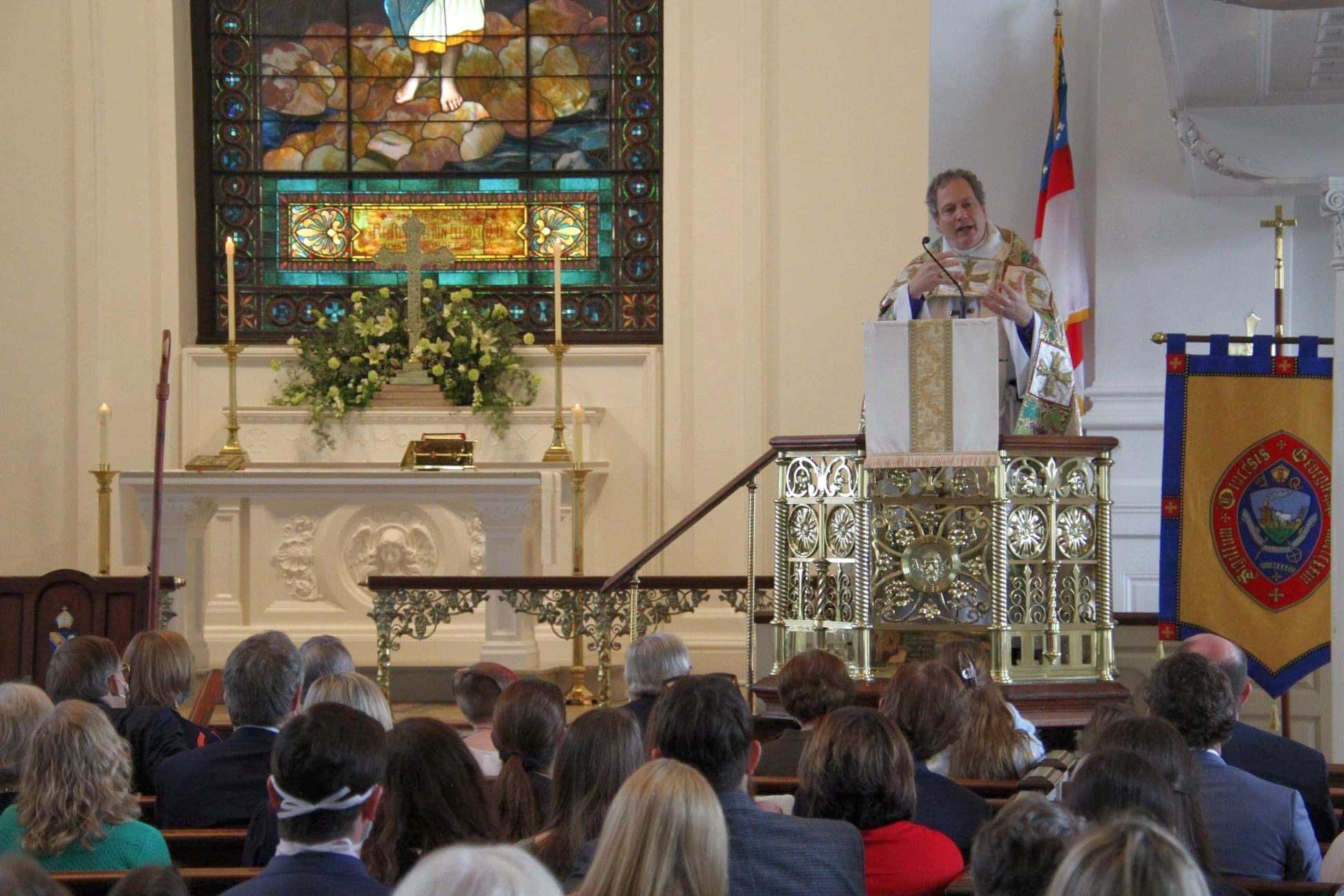Hope for those in deep water
Bishop Frank Logue preached this sermon at Christ Church Episcopal in Savannah, Georgia, on February 6, 2022.
Hope for those in deep water
Luke 5:1-11
For those who are stretched thin, stressed out, over-committed, and really struggling, there is some very Good News in our scripture readings. These texts offer a lifeline for those who are in too deep from the perspective of people who don’t wonder if they measure up, they each know they are not enough for what they face.
Here is the quick recap: The Prophet Isaiah starts us off by saying, “Woe is me! I am lost.” He finds himself in God’s presence and knows he is unworthy. Then Paul describes himself at “Unfit” for the work before him.
Simon Peter hasn’t had the best of nights either. He tells Jesus, “We have worked all night long but have caught nothing,” only to have the Rabbi Messiah-splain fishing to a guy who has done nothing else for a living. Then after a miraculous catch, he falls at Jesus’ feet saying, “Go away from me, Lord, for I am a sinful man!”
 Nothing sounded like Good News to me until I looked at the Gospel passage from below, well below the waters of the Sea of Galilee, seeing a net descending. Okay, I know, a story of nets bursting with fish may not sound like Good News for the fish, but there is something deeper going on here. I stumbled into grace and love when I realized what Jesus did not say.
Nothing sounded like Good News to me until I looked at the Gospel passage from below, well below the waters of the Sea of Galilee, seeing a net descending. Okay, I know, a story of nets bursting with fish may not sound like Good News for the fish, but there is something deeper going on here. I stumbled into grace and love when I realized what Jesus did not say.
I thought Jesus was going to tell the fisher folk, “Follow me, and I will make you fishers of men.” That is not what Jesus said. Instead, as Deacon Patti read, Jesus says, “Do not be afraid; from now on you will be catching people.” I looked it up in the original Greek and found that there is even more nuance in the ancient text which says, “you will be catching people alive.”
For those of us who have often heard the phrase “Fishers of men,” fear not. That is in the Bible. In telling this story, Matthew and Mark both use that same play on words, of fishing for humans. It is in the Bible. But the Gospel writer in the physician Luke and he diagnoses what is going on here differently. At the start of his Gospel he told us that others have written the story of Jesus, but he interviewed people who were there in the beginning and is writing an orderly account of Jesus’ whole life and ministry. Luke knew Jesus to be the Good Shepherd who would leave the safe and sound 99 sheep to rescue the one left out in the night alone.
Luke saw how Jesus treated the many people who had gotten themselves in too deep—from Matthew and Zaccheus who found the tax racket unfulfilling, to a woman about to be put to death for adultery, and the thief dying next to him on a Roman cross. Luke knew that Jesus went to the lepers shunned by others and prayed for them. Jesus stopped by a well in Samaria and encountered a woman seeing herself through the eyes of a judgmental community so that she would not get water when others would be there.
Luke looked ahead to the time when these followers of Jesus would be preaching and teaching long after Jesus’ resurrection and ascension. He didn’t see a boat full of dying fish, but a church full of people scooped up to safety after having found themselves lost in the chaos of the deep. Luke emphasized the good news by saying the followers of Jesus would bring people up from the depths alive.
There is no us and them here—Us, the people who are okay, and them, the people who don’t have their lives in order. I used to think that there were two times in life—the times when I had my act together and the times when life was suddenly spinning out of control. But we all come to see that control is an illusion. For people who feel like they have everything under control and life is just perfect will come to the day when they can’t hold it together and that is not the end. For followers of Jesus, when our carefully maintained façade crumbles, God is there, loving the person behind the persona.
Christians, dare I say, even Episcopalians, don’t have inherently easier lives with no rough spots. Following Jesus, won’t keep us out of a car wreck or health crisis. We end up in the emergency room or ICU like anyone else. And we too can put our hope in good grades, the perfect school, the right spouse or house or car or career—not bad in themselves, actually quite good, these are still no safety net. So we can end up like Simon Peter in the Gospel who he has been working hard with nothing that lasts to show for it.
 Yet, what we do have as followers of Jesus is a relationship with the God who is working to redeem our world one wild and precious life at a time. What we have is the knowledge that everything we now see and experience is not all there is. The creator of the cosmos knows you by name, has always loved you, will never give up on you, and wants better for you. We have the hope in the God who goes to the depths of human existence to love, truly love, those who see themselves as lost, unfit, and sinful. God is always offering a chance for a clean slate, a fresh start, and will never leave you to the chaos that threatens to consume you. God will send a net.
Yet, what we do have as followers of Jesus is a relationship with the God who is working to redeem our world one wild and precious life at a time. What we have is the knowledge that everything we now see and experience is not all there is. The creator of the cosmos knows you by name, has always loved you, will never give up on you, and wants better for you. We have the hope in the God who goes to the depths of human existence to love, truly love, those who see themselves as lost, unfit, and sinful. God is always offering a chance for a clean slate, a fresh start, and will never leave you to the chaos that threatens to consume you. God will send a net.
This passage of a call to follow Jesus also serves as a reminder that the love of God is not supposed to be like a pocket warmer, that keeps you warm while leaving others out in the cold. Jesus did not teach us to just love God and love ourselves, though that is two thirds of what he said. Jesus also taught us to love out neighbors as ourselves. Each one of us comes into contact with people every day who don’t know how they are going to make it through the next 24 hours, much less the week ahead. We are surrounded by people are masking deep pain with prescription drugs, alcohol, workaholism, people pleasing to the point of destroying their lives, and a host of other self-defeating behaviors.
This is why I find youth ministry to be the front lines of ministry. It is a miracle people get out of middle school and high school with any shred of self asteem and that was true before the pandemic. Most people sometime between the age of 10 and 25 pick up emotional wounds that will remain festering and seeping poison into their psyches unless they can find healing.
At 40, they remember the name of the bully in sixth grade and at 50, they recall the friend who gossiped and betrayed them. Any of us can fall into replaying tapes in our heads of the harsh and cruel things others have said and see ourselves through their eyes. If you take those messages to heart, you are not seeing yourself as God sees you. God sees you as beloved.
For hurting people, the good news of Jesus is not about getting into heaven, though it is about that. The Gospel is as much about getting people out of the hell they are in now. And we can be a part of how God accomplishes this. You and I can offer listening ear, a kind word, or even (dare I say it in pandemic), a hug. We get to be a part of stopping the cycle of pain and abuse as we share love and compassion with our friends, co-workers, and family, those we are connected with closely who find life spinning out of control.
When the Holy Spirit reaches out to those who feel lost and abandoned, God uses people like you and me to make the love of God real.
We will reaffirm in just a moment, that as baptized Christians, we all share a common call to proclaim by word and example the Good News of God in Christ as we seek and serve Christ in all persons and respect the dignity of every human being. For none of us can be truly free until we are all free. We cannot be truly at liberty while another beloved child of God is lost in the depths. Far from being a chore, showing love and compassion to someone who is hurting is how God blesses us with that same love.
Amen.
